#same bat time same bat mitzvah
Explore tagged Tumblr posts
Text
Jewish Roleplaying Games 3e
Hanukkah may be over, but there's never a bad time of year to play Jewish tabletop games.

View On WordPress
#beyond the pale#chickadee tales llc#dice#esther and the queens#grandma&039;s drinking song#hanukkah goblins#helka björk unnardottir#heroforge#if i were a lich man#jewish ttrpgs#keeping the lights on#lucian kahn#max fefer#ritualwell#same bat time same bat mitzvah#society of rafa#tabletop miniatures#ttrpg#yochai gal
2 notes
·
View notes
Text
mdni 🃏
thinking about luke as your mom’s friend’s son who only comes over when your parents hang out…yk the one….anyway here’s a shitty drabble
being all awkward smiles and painful small talk for the first hour of whatever family event your parents had dragged you to this time.
indulging in more than a few cocktails that your older cousins snuck to each of you from the bar.
(the dodgy bar in the dodgy events building that had been hired out for whatever birthday party/baby shower/bat mitzvah was happening. you didn’t really care all that much, anyway.)
the liquid courage fuelling the conversation, pulling up old memories you had buried and bubbling over the giggles you shared as you drank in the corner.
getting progressively tipsy, sharing secret smirks when your mom passed a comment about how “it was as if you two had never been apart!”
luke’s hand in yours — older, mature, callused; so different from how they used to feel when you were kids, although those memories were fading, being replaced with something much more carnal. something you were less likely to share over a cocktail at a family party.
sneaking away from the crowds — easy enough, everyone was drunk.
cutting through hallways, passing the drunkards who lingered outside of the chaos. they were smoking, arguing on the phone, waiting for a cab, looking for the bathroom. you?
you were being pressed against the wall of an empty stairwell, gasping quietly at luke’s mouth on yours. his hands on your waist, then your back, your arms, the sides of your neck. everywhere he’d been thinking about touching since he knew what touching meant.
and you were the same. fingers under his blazer, dipping into his waistband for a teasing second before returning to the outside world — but he noticed. how could he not? the firm pull of your body against his was response enough, his right hand coming down to hitch your leg around his hip.
your crotches burned with desire, rubbing against each other with every small movement of your bodies. aching for more whenever you paused for just a second because you thought you could hear someone passing the bottom of the stairs a few feet below you. all they would have to do is ascend the first set, and they’d spot you there. but neither of you cared.
luke inching a hand up your dress, dipping his fingers beneath your panties and huffing into your ear when your wetness coated them after one stroke. your own hand, fiddling with his belt and making sure nobody heard the clanging of the buckle as you undid it with fervour, eagerly searching for his cock once you could stick your hand in there to your wrist comfortably.
moaning in each-other’s ears. grinding on each-other’s hands. sucking in deep gulps of air whenever you got too loud, whenever the slurring speech of an uncle you’d never met faded in, and then out of shot.
luke cumming in his underwear, your hips spitting and sputtering against his palm only moments later.
cleaning yourselves up, catching your parents at the bottom of the stairs just as they passed by in search of you. sharing a look.
in the years you’d known him, you’d never exchanged socials. you didn’t need to. you just hoped he would be at the next family function.
#you can write about this concept if you want#because this is shitty and rushed#pls tag me if you do#i wanna read it#@mills drabbles#luke castellan smut#luke castellan x reader#luke castellan
2K notes
·
View notes
Text
Writing Notes: Culture

There are many definitions of culture and it is used in different ways by different people.
Culture - may be defined as patterns of learned and shared behavior that are cumulative and transmitted across generations.
Patterns
There are systematic and predictable ways of behavior or thinking across members of a culture.
Emerge from adapting, sharing, and storing cultural information.
Can be both similar and different across cultures.
Example: In both Canada and India it is considered polite to bring a small gift to a host’s home. In Canada, it is more common to bring a bottle of wine and for the gift to be opened right away. In India, by contrast, it is more common to bring sweets, and often the gift is set aside to be opened later.
Sharing
Culture is the product of people sharing with one another.
Humans cooperate and share knowledge and skills with other members of their networks.
The ways they share, and the content of what they share, helps make up culture.
Example: Older adults remember a time when long-distance friendships were maintained through letters that arrived in the mail every few months. Contemporary youth culture accomplishes the same goal through the use of instant text messages on smartphones.
Learned
Behaviors, values, norms are acquired through a process known as enculturation that begins with parents and caregivers, because they are the primary influence on young children.
Caregivers teach kids, both directly and by example, about how to behave and how the world works.
They encourage children to be polite, reminding them, for instance, to say “Thank you.” They teach kids how to dress in a way that is appropriate for the culture.
Culture teaches us what behaviors and emotions are appropriate or expected in different situations.
Example: In some societies, it is considered appropriate to conceal anger. Instead of expressing their feelings outright, people purse their lips, furrow their brows, and say little. In other cultures, however, it is appropriate to express anger. In these places, people are more likely to bare their teeth, furrow their brows, point or gesture, and yell (Matsumoto, Yoo, & Chung, 2010).
Learned: Rituals
Members of a culture also engage in rituals which are used to teach people what is important.
Example 1: Young people who are interested in becoming Buddhist monks often have to endure rituals that help them shed feelings of specialness or superiority—feelings that run counter to Buddhist doctrine. To do this, they might be required to wash their teacher’s feet, scrub toilets, or perform other menial tasks.
Example 2: Similarly, many Jewish adolescents go through the process of bar and bat mitzvah. This is a ceremonial reading from scripture that requires the study of Hebrew and, when completed, signals that the youth is ready for full participation in public worship.
These examples help to illustrate the concept of enculturation.
Cumulative
Cultural knowledge is information that is “stored” and then the learning grows across generations.
We understand more about the world today than we did 200 years ago, but that doesn’t mean the culture from long ago has been erased.
Example: Members of the Haida culture, a First Nations people in British Columbia, Canada are able to profit from both ancient and modern experiences. They might employ traditional fishing practices and wisdom stories while also using modern technologies and services.
Transmission
Passing of new knowledge and traditions of culture from one generation to the next, as well as across other cultures is cultural transmission.
In everyday life, the most common way cultural norms are transmitted is within each individuals’ home life.
Each family has its own, distinct culture under the big picture of each given society and/or nation.
With every family, there are traditions that are kept alive.
The way each family acts and communicates with others and an overall view of life are passed down.
Parents teach their kids every day how to behave and act by their actions alone.
Outside of the family, culture can be transmitted at various social institutions like places of worship, schools, even shopping centers are places where enculturation happens and is transmitted.
Understanding culture as a learned pattern of thoughts and behaviors is interesting for several reasons:
It highlights the ways groups can come into conflict with one another. Members of different cultures simply learn different ways of behaving. Teenagers today interact with technologies, like a smartphone, using a different set of rules than people who are in their 40s, 50s, or 60s. Older adults might find texting in the middle of a face-to-face conversation rude while younger people often do not. These differences can sometimes become politicized and a source of tension between groups. One example of this is Muslim women who wear a hijab, or headscarf. Non-Muslims do not follow this practice, so occasional misunderstandings arise about the appropriateness of the tradition.
Understanding that culture is learned is important because it means that people can adopt an appreciation of patterns of behavior that are different than their own.
Understanding that culture is learned can be helpful in developing self-awareness. For instance, people from the United States might not even be aware of the fact that their attitudes about public nudity are influenced by their cultural learning. While women often go topless on beaches in Europe and women living a traditional tribal existence in places like the South Pacific also go topless, it is illegal for women in some of the United States to do so. These cultural norms for modesty that are reflected in government laws and policies also enter the discourse on social issues such as the appropriateness of breastfeeding in public. Understanding that your preferences are, in many cases, the products of cultural learning might empower you to revise them if doing so will lead to a better life for you or others.
Humans use culture to adapt and transform the world they live in and you should think of the word culture as a conceptual tool rather than as a uniform, static definition.
Culture changes through interactions with individuals, media, and technology, just to name a few.
Culture generally changes for one of 2 reasons:
Selective transmission or
to meet changing needs.
This means that when a village or culture is met with new challenges, for example, a loss of a food source, they must change the way they live.
It could also include forced relocation from ancestral domains due to external or internal forces.
Example: In the United States, tens of thousands Native Americans were forced to migrate from their ancestral lands to reservations established by the United States government so it could acquire lands rich with natural resources. The forced migration resulted in death, disease and many cultural changes for the Native Americans as they adjusted to new ecology and way of life.
Source ⚜ More: On Psychology ⚜ Writing Notes & References
#writing notes#culture#psychology#writeblr#writing reference#dark academia#spilled ink#literature#writers on tumblr#writing prompt#poetry#poets on tumblr#creative writing#writing resources
183 notes
·
View notes
Photo

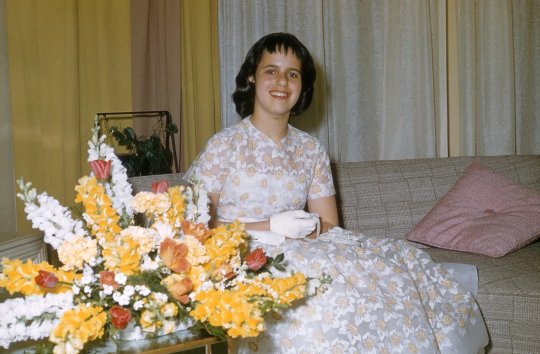
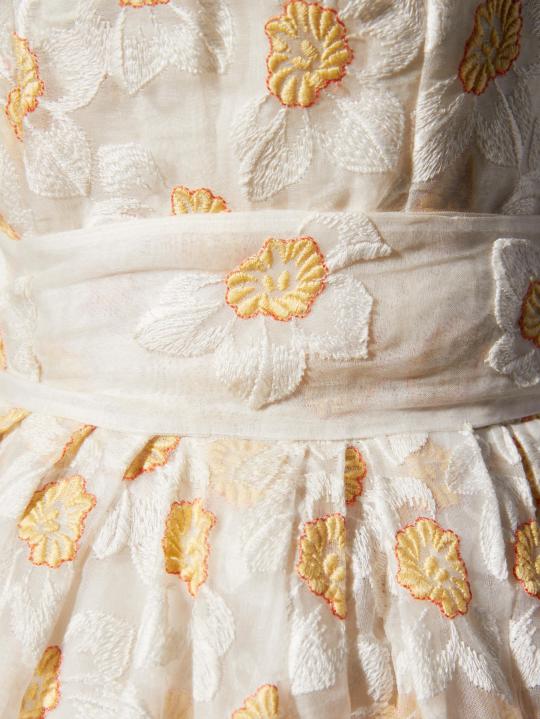

Custom Dress worn by Elaine Roebuck to her Bat Mitzvah
Christian Dior
Spring 1957
“It all started when I was twelve years old and I wanted a bat mitzvah. My father said absolutely not — girls didn’t have bat mitzvahs in those days,” Roebuck tells me. “My mother rallied for me and finally my father said OK. The next thing I knew, we were on the train to Montreal to look at my dress.”
The dress in question is a silk organdy masterpiece custom designed by Monsieur Christian Dior himself. Dior did not design for children back in ‘57, but he made an exception. “Not just anyone could go in and say ‘whip me up a dress for my daughter’s Bat Mitzvah’ – that wasn’t their business,” says Dr. Alexandra Palmer, the museum’s senior fashion curator. But that’s just what Elaine’s mother, the late Molly Roebuck, did. “She had a motto: If you’re going to do something, you better do it right,” says her daughter. “And in her mind, Dior was just right.” Likely, the exception was made on account of Dior’s relationship with Holt Renfrew, the prestigious high-end retailer with exclusive rights to his collection in Canada back when it launched.
So, with the help of her friend, buyer Betty Macpherson, Roebuck commissioned the dress in Paris. It was to be modest, but fantastical enough for such a special night. After a few months of trading sketches with Dior himself, the muslin models arrived in Montreal, where Dior’s pieces were made-to-measure for the Canadian market. “The dress was dreamlike and it made me think, or maybe even feel, like a princess,” says Roebuck. The end result was a full-skirted silk organdy cocktail dress with daffodil embroidery. As it was a one off, the fabric never appeared in Dior’s collections. “I knew the dress was special, but at the same time, I didn’t think I was different from any of my friends,” she says. (Teen Vogue)
Royal Ontario Museum (Object number: 2013.68.14.1-2)
#evening dress#fashion history#vintage fashion#christian dior#1950s#20th century#1957#france#canada#floral#flower print#cotton#organdy#embroidery#white#yellow#up close#vintage photography#photography#childrensfashion#royal ontario museum#crying because this is such a sweet story
357 notes
·
View notes
Text
A touch on Bar and Bat Mitzvahs
Once again, I should probably put more research than I am doing in it, but whatever.
So, I saw a few posts going around about em, and I wanted to clarify I a few things
Q1) What is a bar/bat mitzvah? A1) It is the child's thirteenth or twelfth birthday.
Q2) But doesn't __ need to happen? A2) No. The only thing that needs to happen for a Bar or Bat Mitzvah to occur is for the child to live long enough to reach their 12/13th hebrew birthday.
Q3) But I thought...? A3) Don't care. I said what I said.
Q4) Ok. Fine. What does it mean/represent? A4) It is the point in time when a kid is responsible for their own keeping of mitzvot. Before this, if the child (for example) ate bacon, a large portion of the responsibility for violating that commandment would fall on the parents. Now if the child eats bacon, all the responsibility falls on the child.
Q5) So the whole torah reading thing....? A5) By modern interpretation/tradition, since they aren't old enough to be responsible for their own actions, they cannot perform mitzvot that an adult would be yotzei be another person doing. (OK digression to explain: One is required to say Hamotzi before eating bread. If another adult says the blessing, and you include yourself mentally, you do not have to actually say it yourself. If a child says it, you still have to make the blessing.) One of the more visible/fun ones is reading from the torah/saying the prayers for reading from the torah. So as a symbol of them now being an adult the tradition emerged that they will read the whole torah portion for the week they turn 13. Eventually it grew into a bigger party
Q6) But Women who are Bat Mitzvah don't read? A6) Whole big thing about obligations and permissions, it is a bit of a balagan tbh. But suffice to say in most religious denoms, women do not read from the torah. There are some that hold it is allowable for a woman to read from the torah, but not to say the blessings.
Q7) Wait, what? A7) I am not getting into it.
Q8) Ok, fine, so Bat Mitzvah parties? A8) A bit more recent than Bar Mitzvah parties. (You can find evidence going a while back, but not common until recently). When my parents were younger sweet 16s were far more common in the secular-religious groups than bat mitzvahs, over the last couple decades Bat Mitzvahs became popular. And at the same time barmitzvahs became bigger events than they had been previously.
Q9) So the whole thing for both is unecessary? A9) Yes.
Q10) And...Adult Bnei Mitzvahs? A10) Don't look at me. People do what they want!
Q11) Wait, what about the prayer that the father says? A11) While definetly a far older tradition, if nobody says it the kid is still Bnei Mitzvah, so it is also uneccesary.
Q12) But what about....? A12) Look, I can't think of any other hypthetical questions, so feel free to ask in the reblogs.
47 notes
·
View notes
Text

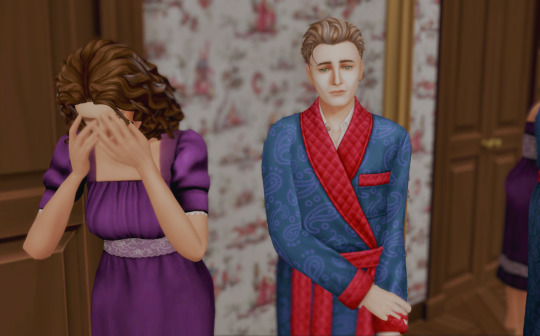
Everything was silent. Byron and Eleora stared at their daughter in abject horror until Eleora buried her face into her hands, and Byron stared at the ground.
“My fucking God,” she mumbled into her hands.
Byron swallowed, shame across his face as he shook his head. “What did we do wrong raising you? I thought we would be better parents than people like us. No nanny, being involved, sending you to primary school with the local children, but somewhere you’ve ended up one of the cruelest and most inconsiderate, spoiled people I know. My own daughter, whom I love and who I raised.”


He left the room, Eleora following out, mumbling something about Miranda as the words sank into her body. Cruel. Inconsiderate. Spoiled. Her father was right. She was all that and everything Miranda had called her. She was going to lose her best friend, and she knew she bloody deserved it. She had ruined her life when she had the chance to make it right, but instead she had belittled her mother and treated her cousin and daughter like shit because they were girls. Her daughter. Shelley was her fucking daughter, and she hadn’t cared less about her. About her well-being, about the toys she liked, and the colors that were her favorite. Her daughter that had the same green eyes as Will Carter. Ludivine was supposed to have her bat mitzvah in March, and Amalia hadn’t even thought about a gift.
A door slammed loudly, shaking her from her thoughts, and she realized it was Miranda’s door, and after another moment, she could hear the drag of a suitcase and muffled voices—Miranda and her mother. Miranda was leaving. Oh god, she was leaving! She had to stop her, beg her to stay, and apologize, beg for forgiveness even if she deserved none of it. Miranda had been at her side since her fucking birth—she wasn’t sure if she stomach life without her.
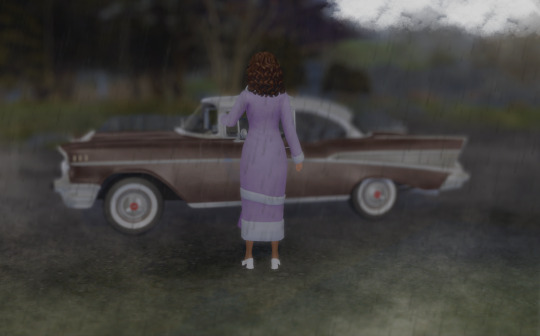
By the time Amalia had hastily shoved on her coat, not bothering with the other winter necessities, it had begun to rain harshly, thunder shaking the sky as freezing cold rain fell with a roar. Outside, she could see Miranda’s car was gone, and the only one left was her father’s. He had taught Simon-Elliot, Miranda, and Amalia to drive, and while Amalia had complained about it then, she had never been more grateful that one, she knew how to drive, and two, that the road near Walshstone Park only went one way—to the town of Henford-on-Bagley.
part 1 (mature warning)/part 2/ part 3/ part 4
beginning/previous/next
#the walshes#the walsh legacy#ts4#the sims 4#sims 4 historical#sims 4 decades#sims 4 decades challenge#ts4 historical#ts4 decades challenge#ts4 story#1950s#ts4 1950s#amalia walsh#byron walsh#eleora balass#the consequences of your actions girl finally hitting
23 notes
·
View notes
Text
Kavanah & Tefillah - Tips for Powerful Davening (19 Shevat)
Tefillah (prayer) is one of the most central components of the Jewish faith. It is a way for us to reach out to our creator, to thank Him for what He has given us and to ask Him for anything we still need. Hashem appreciates it deeply when we take the time out of our day to talk to HIm, and truly wants to answer as many of our prayers as possible, though sometimes in unexpected ways. So, if it ever seems like your prayers aren’t being answered, know that Hashem is still listening no matter what, but try some of these tips to get the ball rolling a little faster!
Start with Gratitude. Who would you rather do a favor for? Someone who starts their request with how grateful they are for the things you do for them, or someone who just asks you for something right off the bat? Probably the former, and Hashem feels the same way. Gratitude is of utmost importance in Jewish law. Our people’s name, Yehudim, comes from the same shoresh (root word) as the word for gratitude, so Hashem values gratitude very highly. He is more likely to answer the prayers of those who are grateful for what he does, as that is His way of teaching us to be more grateful. Therefore, next time you have a request for Hashem, you should start by thinking about all the blessings Hashem has already bestowed upon you.
Be Less Specific. Imagine that someone is davening to get into a specific university which has the highest rate of acceptance into medical school… but really their destiny is to be an artist. Hashem may not grant this prayer to be accepted into that university, because Hashem knows that this person’s true path lies elsewhere. If you are praying for something overly specific, the same thing may happen to you. Instead, be more broad with your prayers. If, in that situation, someone prayed to simply have a successful future instead of to get into a specific university, Hashem would get their art career started and grant them success quickly. Next time you are about to pray for something specific, pray for your end goal instead, and since Hashem always knows what you need, Hashem might take you there in an unexpected way!
Be Selfless. Selflessness is another Jewish value (perhaps the most important one in the entire Torah) which Hashem cares deeply about. It is a well known fact that davening is more effective when it is done for someone else. As such, it can be helpful to daven for things that benefit others, or to have your loved ones daven for you as Hashem is more likely to grant selfless prayers. This is also why your prayers are much more likely to be granted if doing so would help you fulfill a mitzvah. Hashem only wants the best for His people, and prefers those who feel the same way.
Daven Every Day. The best way to improve your relationship with anyone is to talk to them as often as possible, and the same is true for Hashem. Since the way you talk to Hashem is by davening, you should daven every day to become closer with Him. Just as you would be more likely to do a favor for a friend than for an acquaintance, Hashem also prefers to grant prayers to people who take the time to know Him more deeply. So, if you feel like your tefillah is not being answered, try to make a habit of talking to Hashem every single day. Besides, who could be a better friend than Hashem?
Take Action! There is an old Jewish story about a man who davened every single day to win the lottery. His davening was perfect! He expressed gratitude towards Hashem, and prayed with the utmost intention and extreme consistency! He does this every day for months, and eventually becomes upset with Hashem for not letting him win the lottery. Eventually, he calls out to Hashem, saying “what’s the deal? I’m a good Jew, I davened perfectly, I’ll donate some of the money as tzedakah, what more do you want from me!?” Hashem’s response? “BUY A LOTTERY TICKET!”. You see, you can daven and daven and daven for years, but if you never take any action towards achieving your goals, nothing will ever happen. So, buy the lottery ticket! If there’s something you’ve been davening for for a long time and it has yet to come true, you need to be the first one to take action to get it done.
If you take the time to put all of these tips into action, not only will you strengthen your relationship with Hashem, but you will also be practicing some of the most important Jewish values. If you become a grateful and selfless person who is deeply connected to Hashem, you will not only be a better person, but you will have the added benefit of getting more of your prayers answered!
Tell me in the tags: Do you have any other advice for more effective davening? Do you have any inspiring stories to share of your prayers being answered?
Jew Joke:
I would drop to my knees twice a day begging Hashem to do anything that would make my life easier.
So He gave me knee pads.
24 notes
·
View notes
Text
So as of late I've been seeing a lot of post along the lines of "I hc Seymour as Jewish because I am" and such. Which obviously there's no issue from me I couldn't care less I just find it funny because he IS Jewish,in fact almost every character in the lsoh universe is and here's why.
(Note: lots of these will be very losely based on names and sometimes the actors/actresses themselves. These don't 100% Guarantee the characters Relgion/Ethnicity. This is just for fun)
Starting with 1960
Seymour krelboin:
Ok first of I don't know how the fuck you spell his name because it's literally spelt a different way every time I look at it because frankly little shop of horrors is a hot mess.
He and his mom both are in the 1960 film I don't know where its stated but if you look it up it says as much. It's also due to the fact it was created by Roger Corman (rest in piece as of writing this he past away last Thursday) who himself ls Jewish and people offten write there characters having the same Relgion or race as them (like Neil simon and how all his characters are Jewish )
Gravis mushnik
Come on,I don't have to explain this one.
Farb
Ok this one is very lose because he has like under 10 minutes of screen Time. First of his last name. Second his actor John Herman shaner himself was Jewish and yeah. I mean you can't prove he's not
Mrs. Shiva
Ok her names is literally a Jewish mourning ceremony (which is so clever absolutely love that) I also believe she may have mentioned a bat or bat mitzvah happening in her family. Also by proxy the deactivate whos her nephew is also.
Burson Fouch
He talks about how the flowers are kosher.
Thats like all the 1960s characters I can remember rn
Onto the musical
Seymour krelborn
He's been "raised" by mushnik so just by proxy also obviously his last name.
Mushnik
I do not need to elaborate
That's like all the musical ones I can find but you can make the argument that orin is aswell because his og name was Jewish.
Onto the cartoon
Audery
Getting out of the way yes mushnik is Jewish and audery is his daughter so she is aswell
Seymour and his mom are also just the same from 1960 (kinda) so them aswell
So yeah good news your headcanons are all correct!
#wrote this like a year ago#im clearing out my drafts#little shop of horrors#musical theater#lsoh seymour#orin scrivello dds#mr mushnik#little shop of horrors audery
7 notes
·
View notes
Text
MGADD Casey general character analysis
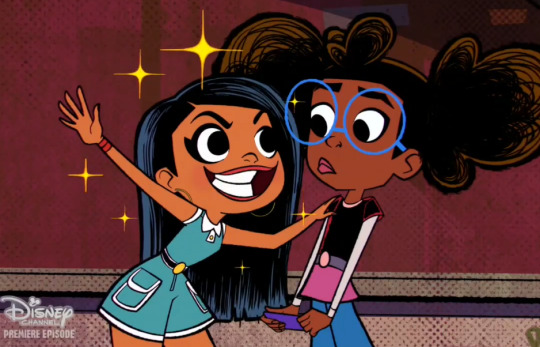
Casey is one of the recurrent characters from Moon Girl and Devil Dinosaur. She could be described as a main character in some ways considering she appears in every other episode. She is Lunella’s best friend and serves the role of sidekick and social media manager of Moon Girl.
She gets introduced in the first episode of the show ¨Moon Girl Landing¨ as someone who is a bit eccentric and didn’t have any friends at school. One of the first characteristics shown is that she is very into social media, having a good grasp of how things operate and how to get information quickly.
After Lunella and Devil save her from almost getting crashed, Casey goes to Lunella’s home to personally thank Lunella for saving her earlier. Casey tells her that she would like her to become a superhero, since her actions inspired her to do similar things. She helps with designing Moon Girl’s suit for Lunella and proposes to be her assistant by doing things like recording her in videos for her to get recognition in social media.
Casey becomes Lunella’s best (very likely first) human friend after the episode and she is frequently shown helping her with having to deal with the villain of the week or some issue that Lunella is going through.
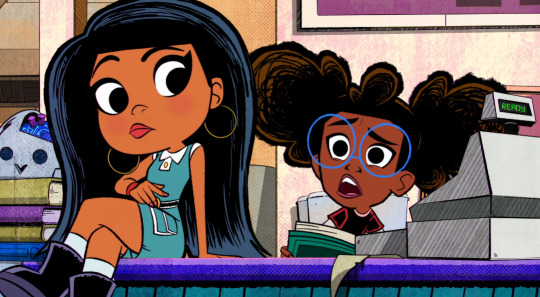
At the core of her personality, Casey in some ways is the opposite of Lunella: She lives in the moment, is spontaneous, easy going and extroverted. She can be emotionally intelligent and considerate in multiple ways, being a contrast to Lunella’s more logical and scientific mind. In some episodes she plays the role of giving personal advice to Lunella that has to do with the theme of the episode at hand.
She has been described by some people who watch the show as a subversion of the mean bully/ influencer girl¨ that you would normally expect them to be superficial and be antagonistic towards the main character, but in Casey’s case she is very nice and helpful towards Lunella. She could be compared to Rarity from MLP FIM in a way, with the main difference that Casey is more down to earth.
Casey, however, isn’t without her flaws as she is a still teenager who has things to learn. Her main fatal flaw is letting her plans go over her head and getting too caught up in being popular and chasing trends. Both flaws are quite tied to each other, as she can come up with ideas to get better accepted in her social circles but then taking it too far at the same time that she gets too invested in trying to chase that popularity.
This comes quite a lot because of how she lacked friends before meeting Lunella at the start of the show. It was implied that she was rather lonely and she didn’t fit in so well with her peers. While she doesn’t have the same issues of getting paralyzed in social interactions as Lunella does, she still has this desire to be one of the popular kids as it happens in some episodes in the series.
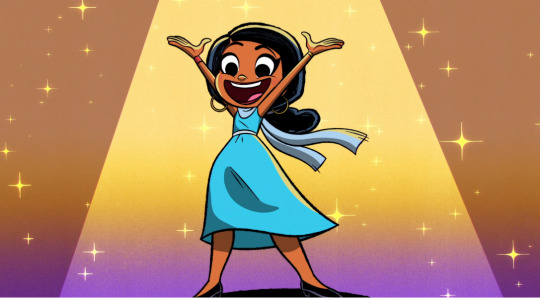
In the episode ¨I Am a Woman Today¨ that explores Casey getting her Bat Mitzvah (Casey is jewish) has Casey feeling jealous of how her cousins have a lot of money and they were able to organize a huge Bat Mitzvah party for them last month. A social media influencer that Casey really looks up to also commented about her cousin's party, making Casey wish she had that level of popularity.
Seeing that Casey is feeling down, she proposes to help her Bat Mitzvah get attention by telling people that Moon Girl is going to be there. The plan works, as a lot of people get interested in going to the party after hearing about the news, with the social media influencer Odessa included. Casey is very happy to get the party that she wished for, thanking Lunella for helping her.
However, the problem comes when Casey gets too caught up in getting more and more likes and ignoring Lunella. She lets the fame take her over, only caring about how big and glamorous her party is that she doesn’t see that Lunella wants to spend time with her (as her normal self and not as Moon Girl). This makes Lunella feel hurt about how Casey is using her superhero status as Moon Girl to get popular and gets upset by the way Casey was ignoring her, making her leave the party after she calls out Casey for her behaviour.
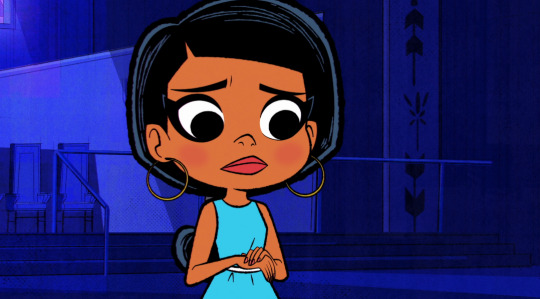
Eventually she realizes that she messed up and that her Bat Mitzvah should be more about spending it with the people she considers family and friends than how big and popular it is. She apologizes to Lunella for how she treated her and the two make up by the end.
There has been other episodes where these flaws are explored like ¨Wish Tar¨ when she convinces Lunella into using Beyonder’s powers to get the latest new trending clothes to fit in with other kids at school. This episode ends up being more about Lunella and her relationship with Beyonder but Casey ends up being part of the problem as well. In one of the earlier episodes, "Run the Rink¨, she gets so caught up in trying to get a lot of attention for the Lunella family’s rink night that it ends up attracting some minor villains who want to take Lunella out. Everything gets taken out of control once Gravitas arrives and almost defeats Moon Girl.
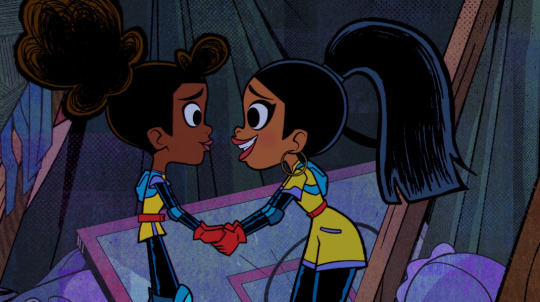
As helpful as Casey could be to Lunella, earlier in the show she didn’t seem to consider how the schedule that she organized was too overwhelming to her friend. In "Moon Girl Day Off¨ Lunella pretends to have her ankle injured so she can have a break from her Moon Girl activities while Casey takes over for her. She lied about getting hurt because she didn’t want to let Casey down. In meantime, while being Moon Girl, Casey sees how busy and demanding can be Lunella’s life as superhero. By the end of the episode Lunella comes clean with her lie and Casey admits that she needs to not satúrate the schedule too much so they are able to have more breaks in between.
Another thing that is worth talking about is after the events of Season 1 finale and Season 2 premiere, Casey thought that Lunella had disappeared or even died. This made her become rather clingy of Lunella for some of the episodes that followed. In "Belly of the Beast" it gets explored how she is scared of the same thing happening again and she should give Lunella more space and not be so overbearing with her.
In a minor aspect, Casey has two fathers and she appears to have a healthy relationship with them. In ¨I Am a Woman Today" their relationship gets explored some, by reminding Casey that her Bat Mitzvah should be a time to spend with her family and friends. It is implied that they are aware of how Casey can get too invested in status and social media likes based on some of their lines. Not much is known about her relationship with them but in some scenes they do appear it is shown she likes spending time with them and helps them with organizing stuff.
In all Casey is a character who serves as Lunella/Moon Girl sidekick and often emotional support. A lot of her personality contrasts Lunella, balancing each other out. Overall she is a loyal and nice friend who can have her own moments getting too much into becoming popular but still tries to do the right thing in the end.
7 notes
·
View notes
Text
Am I the only a bit confused by the timeline in Moon Girl and Devil Dinosaur?
As we all know, Lunella's 13, going on 14 and in the 8th grade. Which we know cause her 7th grade look is noticeably different. School has already started, and we've seen her going to school in many episodes.


It isn't until "Like Mother, Like Moon Girl" where I get confused. The block party is on June 21th. Like when was it summer?!


The block party's been brought up twice in season two. Again, we see Lunella in the same classes in school beforehand. So was the date an error?


Then the episode right after, we get to "Today, I Am a Woman" when not only are Lunella and Casey IN SCHOOL, but they celebrate Casey's postponed Bat Mitzvah (if you wanna know why I think it was postponed, link here).


In the episode "Lava Actually" Pops reveals that the day after Merle and Matsuye showed up for their visit was the Perihelion. Which would make that day's date, January 2nd, 2024.

Finally we reach the episode "Full Moon" where Lunella reveals that she and Adria haven't spent time together in months. Which has me believing the episodes "Ride Along" and "Lava Actually" are at least two months apart if not more.

It's not that big of a deal, but I'm abit confused and curious to know what you guys think.
#Marvel's Moon Girl and Devil Dinosaur#Moon Girl and Devil Dinosaur#MGaDD#Lunella Lafayette#Adria Lafayette#Casey Goldberg-Calderon#Casey Calderon#Issac Goldberg-Calderon#Antonio Goldberg-Calderon#James Lafayette Sr#Pops Lafayette#Cartoon Fandoms#Cartoon Characters#Favorite Characters
19 notes
·
View notes
Text
Another from M.A. Rothman (I thought I had misplaced this)
I don’t think I’ve posted this previously to my author profile, sorry if it’s a duplicate.
𝐖𝐡𝐚𝐭 𝐈 ����𝐞𝐚𝐫𝐧𝐞𝐝 𝐢𝐧 𝐭𝐡𝐞 𝐏𝐞𝐚𝐜𝐞 𝐂𝐨𝐫𝐩𝐬 𝐢𝐧 𝐀𝐟𝐫𝐢𝐜𝐚: 𝐓𝐫𝐮𝐦𝐩 𝐈𝐬 𝐑𝐢𝐠𝐡𝐭
By Karin McQuillan
Three weeks after college, I flew to Senegal, West Africa, to run a community center in a rural town. Life was placid, with no danger, except to your health. That danger was considerable, because it was, in the words of the Peace Corps doctor, "a fecalized environment."
In plain English: s--- is everywhere. People defecate on the open ground, and the feces is blown with the dust – onto you, your clothes, your food, the water. He warned us the first day of training: do not even touch water. Human feces carries parasites that bore through your skin and cause organ failure.
Never in my wildest dreams would I have imagined that a few decades later, liberals would be pushing the lie that Western civilization is no better than a third-world country. Or would teach two generations of our kids that loving your own culture and wanting to preserve it are racism.
Last time I was in Paris, I saw a beautiful African woman in a grand boubou have her child defecate on the sidewalk next to Notre Dame Cathedral. The French police officer, ten steps from her, turned his head not to see.
I have seen. I am not turning my head and pretending unpleasant things are not true.
Senegal was not a hellhole. Very poor people can lead happy, meaningful lives in their own cultures' terms. But they are not our terms. The excrement is the least of it. Our basic ideas of human relations, right and wrong, are incompatible.
As a twenty-one-year-old starting out in the Peace Corps, I loved Senegal. In fact, I was euphoric. I quickly made friends and had an adopted family. I relished the feeling of the brotherhood of man. People were open, willing to share their lives and, after they knew you, their innermost thoughts.
The longer I lived there, the more I understood: it became blindingly obvious that the Senegalese are not the same as us. The truths we hold to be self-evident are not evident to the Senegalese. How could they be? Their reality is totally different. You can't understand anything in Senegal using American terms.
Take something as basic as family. Family was a few hundred people, extending out to second and third cousins. All the men in one generation were called "father." Senegalese are Muslim, with up to four wives. Girls had their clitorises cut off at puberty. (I witnessed this, at what I thought was going to be a nice coming-of-age ceremony, like a bat mitzvah or confirmation.)
Sex, I was told, did not include kissing. Love and friendship in marriage were Western ideas. Fidelity was not a thing. Married women would have sex for a few cents to have cash for the market.
What I did witness every day was that women were worked half to death. Wives raised the food and fed their own children, did the heavy labor of walking miles to gather wood for the fire, drew water from the well or public faucet, pounded grain with heavy hand-held pestles, lived in their own huts, and had conjugal visits from their husbands on a rotating basis with their co-wives. Their husbands lazed in the shade of the trees.
Yet family was crucial to people there in a way Americans cannot comprehend.
The Ten Commandments were not disobeyed – they were unknown. The value system was the exact opposite. You were supposed to steal everything you can to give to your own relatives. There are some Westernized Africans who try to rebel against the system. They fail.
We hear a lot about the kleptocratic elites of Africa. The kleptocracy extends through the whole society. My town had a medical clinic donated by international agencies. The medicine was stolen by the medical workers and sold to the local store. If you were sick and didn't have money, drop dead. That was normal.
So here in the States, when we discovered that my 98-year-old father's Muslim health aide from Nigeria had stolen his clothes and wasn't bathing him, I wasn't surprised. It was familiar.
In Senegal, corruption ruled, from top to bottom. Go to the post office, and the clerk would name an outrageous price for a stamp. After paying the bribe, you still didn't know it if it would be mailed or thrown out. That was normal.
One of my most vivid memories was from the clinic. One day, as the wait grew hotter in the 110-degree heat, an old woman two feet from the medical aides – who were chatting in the shade of a mango tree instead of working – collapsed to the ground. They turned their heads so as not to see her and kept talking. She lay there in the dirt. Callousness to the sick was normal.
Americans think it is a universal human instinct to do unto others as you would have them do unto you. It's not. It seems natural to us because we live in a Bible-based Judeo-Christian culture.
We think the Protestant work ethic is universal. It's not. My town was full of young men doing nothing. They were waiting for a government job. There was no private enterprise. Private business was not illegal, just impossible, given the nightmare of a third-world bureaucratic kleptocracy. It is also incompatible with Senegalese insistence on taking care of relatives.
All the little stores in Senegal were owned by Mauritanians. If a Senegalese wanted to run a little store, he'd go to another country. The reason? Your friends and relatives would ask you for stuff for free, and you would have to say yes. End of your business. You are not allowed to be a selfish individual and say no to relatives. The result: Everyone has nothing.
The more I worked there and visited government officials doing absolutely nothing, the more I realized that no one in Senegal had the idea that a job means work. A job is something given to you by a relative. It provides the place where you steal everything to give back to your family.
I couldn't wait to get home. So why would I want to bring Africa here? Non-Westerners do not magically become American by arriving on our shores with a visa.
For the rest of my life, I enjoyed the greatest gift of the Peace Corps: I love and treasure America more than ever. I take seriously my responsibility to defend our culture and our country and pass on the American heritage to the next generation.
African problems are made worse by our aid efforts. Senegal is full of smart, capable people. They will eventually solve their own country's problems. They will do it on their terms, not ours. The solution is not to bring Africans here.
We are lectured by Democrats that we must privilege third-world immigration by the hundred million with chain migration. They tell us we must end America as a white, Western, Judeo-Christian, capitalist nation – to prove we are not racist. I don't need to prove a thing. Leftists want open borders because they resent whites, resent Western achievements, and hate America. They want to destroy America as we know it.
As President Trump asked, why would we do that?
We have the right to choose what kind of country to live in. I was happy to donate a year of my life as a young woman to help the poor Senegalese. I am not willing to donate my country.
https://www.americanthinker.com/.../what_i_learned_in...
5 notes
·
View notes
Text
Libby and absent parenting
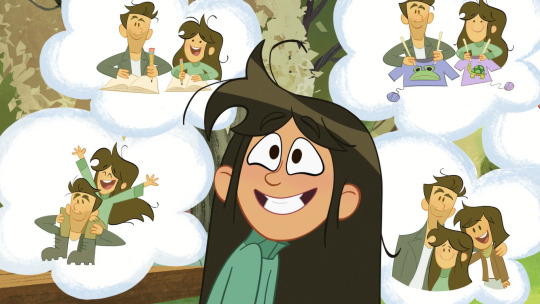
One of the most recent episodes from Season 2 ¨Like Father, Like Libby¨ explored Libby’s relationship with her father, Matias, who hasn’t seen Libby for years because ¨he has been too busy travelling to write his novel¨. Of course, it is easy to realize that this isn’t the case: Matias is an absent father and he isn’t interested in being involved in his daughter’s life. The theme of this episode is exploring Libby’s ilusion to see her father again and wishing to spend time with him, something that eventually is shattered when her expectations don’t meet with reality.
Matias is never mentioned in Season 1 by neither Libby nor Leah, Libby’s mother. When Libby talked about the people that were important to her Bat Mitzvah (Episode-Mazel Tov, Libby!), Libby never mentioned Matias once, only Leah and Molly. This already hinted how absent he was in Libby’s life, to the point he was never brought up to Molly nor Scratch.
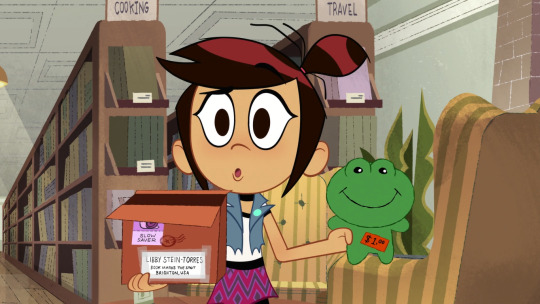
At the start of the episode when Libby gets her Bat Mitzvah gift months after the celebration, one can tell that there are some red flags: The gift was sent several months after Libby’s Bat Mitzvah, the price of the gift is only one dollar and the plush isn’t even something a turtle, it is a frog. Molly quickly realizes that something is off from this gift but keeps it to herself since Libby is very happy to learn that Matias wants to meet her in person after years of not seeing her. Molly doesn’t know enough about Libby’s father neither to give a full opinion on him because it is something that she doesn’t ask Libby about. She still brings up to Libby that she can talk about Matias anytime, without pressuring to explain her situation and respecting her privacy.
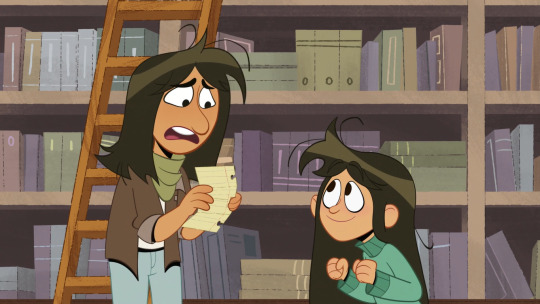
Libby shows Leah the letter she received from her father. Leah’s very hesitant in doing such a long trip to see Matias. However, she sees that Libby is very excited about the idea of seeing him again, so, Leah decides to support Libby by taking her to the place she is supposed to meet with Matias.
Throughout the episode we see Leah’s struggle between supporting her daughter and trying to be honest with her about how Matias doesn’t really care about her. She doesn’t want to fully break Libby’s illusion since she knows that this is important for her but, at the same time, she warns Libby about not raising her expectations too high and explaining that Matias isn’t that good as she think she is.
Despite of her dislike for Matias, Leah is very considerate in not making Libby hate him. She understands that Libby is entitled to see her father and trying to reconnect with him, even he doesn’t feel the same way about Libby. Lea still warns her a few times, for her to get that maybe things aren’t going to turn out the way she wants and reassures her that she is there for her.
What is so devastating about this episode is how Libby acts very accurately like a kid with absent parent/s would. She makes up excuses why Matias hasn’t seen her all these years- he is too busy writing his novel. She genuinely wants to believe that he cares about her and, that once she meets him again, they are going to spend time together and he is going to be involved in her life. It’s a very sad situation to see, because Libby still doesn’t come to terms with the type of parent that Matias is. She wants to believe that he has changed or that he is only busy. She has a whole song sequence imagining all the things that they are both going to do together. She thinks that her parents are going to get back together.
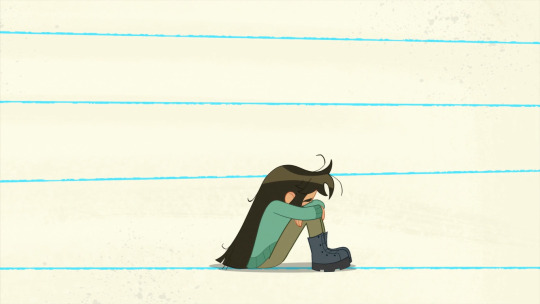
However... there is a part of her that tells her that Matias doesn’t care about her and he is ¨gone¨. This means that she is partially aware of her father’s behaviour but, like any kid who has neglectful parents, she wants to believe that this isn’t true, that Matias is a ¨good father¨.
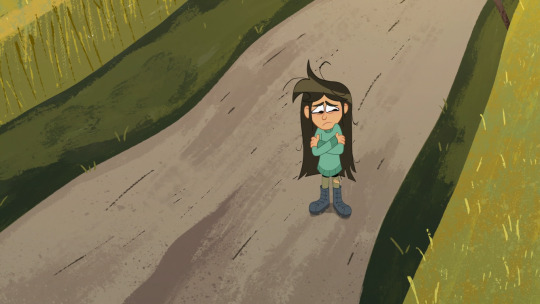
Libby’s abandonment issues and the overall impact of having an absent father being explored in this episode puts some scenes from previous episodes in context. The biggest example of this is ¨Friend-Off¨ where we see Scratch and Libby’s competing over who is Molly’s ¨Best Friend¨. While Libby’s insecurities in ¨Friend-Off¨ could come from her lacking friends before meeting Molly, knowing that she has a negletful father puts her animosity and treatment towards Scratch during the episode in perspective. She is scared of losing Molly as a friend or not being good enough for her. There are moments she thinks that the curse Molly and Scratch shared made their bond closer than her with Molly.
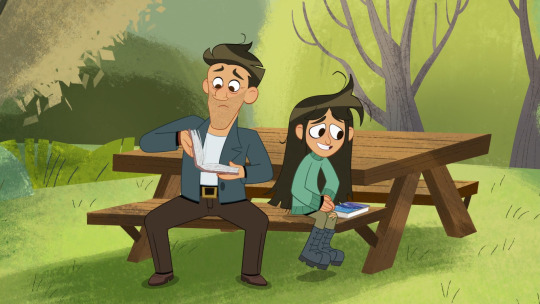
Back to ¨Like Father, Like Libby¨, when Libby finally meets Matias, she is very happy to see him again but it doesn’t take her less than a minute to notice that he isn’t paying attention to her. She shows to him a book she wrote, something that she mentioned in multiple letters she send to him. Matias doesn’t seem to be aware of this, implying he didn’t read those said letters. He only takes a photo with Libby’s book to make himself look like a good father in social media.
Libby talks to him about all the things that they are going to do now that they are together only to be interrupted by Matias telling her that he is going to be ¨too busy¨ writing his book trilogy. This is the moment Libby’s illusion crashes and she is forced to face the fact that her father doesn’t care about her and doesn’t want to spend time with her. She quickly runs and gets into the car, crying by realizing that Matias doesn’t want to stick around.
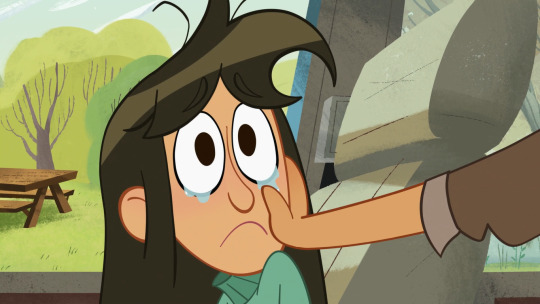
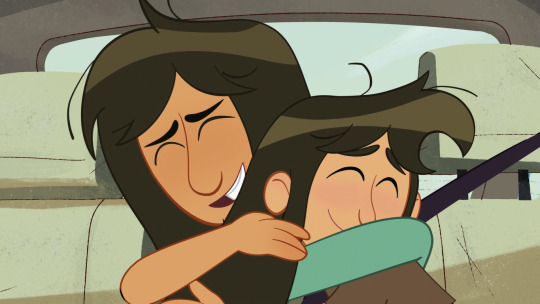
Leah comforts Libby by telling her that she is her ¨miracle¨ and Libby thanks her mother for always being there for her. The two return home, with Libby knowing that Matias isn’t worth of her attention and she should focus instead in that people that actually care about her. She gains a lot of appreciation for Leah as well, considering how she took her time to drive two states for Libby to see Matias and how caring and supportive she is.
¨Like Father, Like Libby¨ is an episode that showed up a new side of Libby and her family. It gave more dimension to Leah who, as a single mother, had to raise Libby on her own. It also shows a good potrayal of a teen finally realizing what type of person their parent is and them having to deal with that.
#The Ghost And Molly McGee#tgamm#libby stein-torres#leah stein-torres#matias torres tgamm#Like father like libby#tgamm analysis#character analysis
141 notes
·
View notes
Text

August 1942, Henford-on-Bagley, England
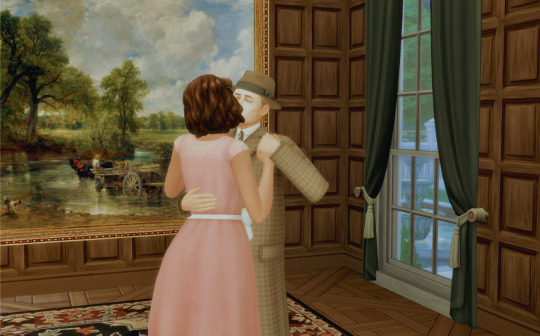
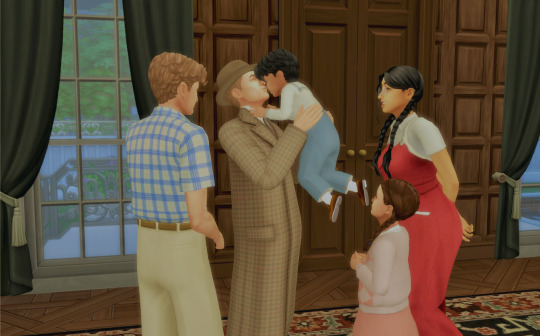
It had been months since Byron had been home, and to see all the children so grown? It was overwhelming—Simon-Elliot was 16, Miranda was 13, Amalia was 12, and little Kit was now 2. How could they have grown so much in the time he’d been away? Guilt filled him—how could he do this to his children? His own father had been very busy, but he always made time for Byron and his siblings. What kind of a father was he?
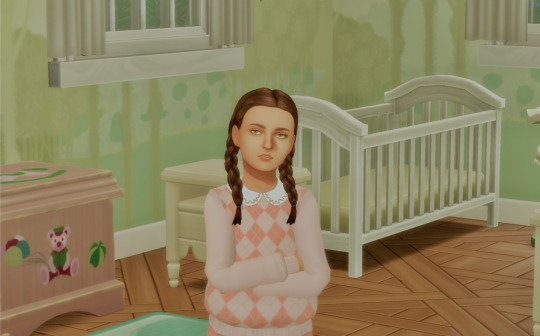
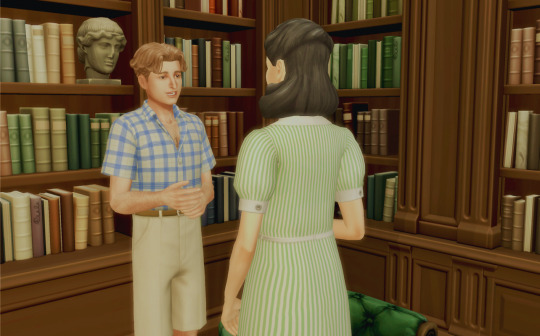
According to Eleora, Amalia had been in a pissy mood for months, ever since she learned she was not to have a bat mitzvah due to the war. They’d had a small ceremony of course, no big party that she was expecting. Byron understood her anger, but Eleora would have none of it, reminding her that her cousin Marie-Louise likely hadn’t had a bat mitzvah either, nor did the other Jewish girls her age living in Europe.
Byron had been aware of Simon-Elliot’s and Lydia’s friendship, but he hadn’t known exactly how close they were. He suspected Simon-Elliot harbored a crush, but he wasn’t sure if Lydia’s own feelings were platonic or not. It was trivial, looking at teenagers and thinking back when he was the same age. He wondered about Joel and his family sometimes. He and Wilhelmina had lost contact years ago. The last he heard she and her husband had moved to Berlin to embrace the art scene there in the late 1920s. Were they still there? Or had they disappeared like dozens of others after Hitler took power?
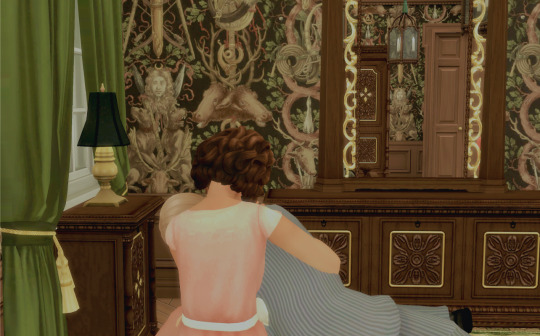
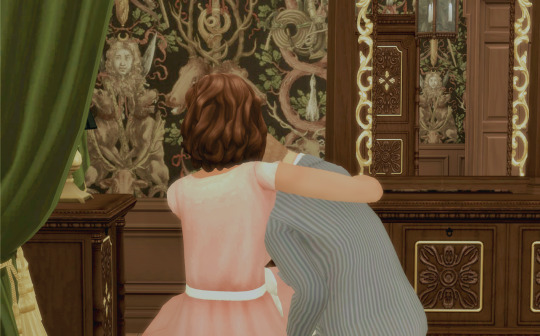
When the couple was finally alone, he let his feelings overwhelm him, and for the first time in years, he wept in his wife’s arms, letting out his guilt over the war, over his children, over his brother-in-law and family.
beginning/previous/next
#the walshes#the walsh legacy#ts4#sims 4 historical#sims 4 decades#sims 4 decades challenge#ts4 historical#ts4 story#1940s#ts4 1940s#ww2#wwii#ts4 ww2#byron walsh#eleora balass#simon-elliot walsh#amalia walsh#miranda macgregor#lydia leung#kit walsh
19 notes
·
View notes
Note
I want to share something. I absolutely adore how you write Astarion. You capture his mirth, the absolute ridiculous stray ginger cat energy he embodies, the tragedy of his situation, and how utterly hilarious he is all at the same time. But what I love especially is how *young* you manage to write him, like this is an elf who was killed before he even reached young adulthood in Elvish culture and you capture that brilliantly in both his mannerisms, sarcastic and sometimes juvenile quips and even his body language. It's just mind-blowing and I love reading your fics due to how well you capture him.
this is such an incredibly sweet comment and thank you so much for making it T_T my heart, it is warmed.
if I may ramble for a moment!
here's my thing: based on the information available to us, it's pretty widely confirmed canon (fanon? since Larian hasn't actually confirmed to my knowledge?) that based on the translated dates on his grave marker, Astarion died at 39. which is VERY young for an elf, but still adulthood, because elves physically and mentally mature at a similar rate to humans. the "they don't reach adulthood until 100" is more cultural than physical/mental, so Astarion very much was an adult with a career and all that when he died. culturally, however, he would not have been considered fully adult by other elves.
kind of like if you had a bar/bat mitzvah at 100 instead of 13? like it's not a measure of physical/mental adulthood, it's a cultural/religious ceremony signifying the passage into adulthood. that kind of thing.
WITH THAT SAID: Astarion did die young (we think) and then was launched into a situation that severely impacted his growth and progression as a person. namely: it stopped. he's frozen in time. he had no opportunity to learn, grow, or change. he was literally prevented from doing so.
Cazador worsened and encouraged this behavior not only in Astarion but in ALL the spawn. he refers to them as children, they're considered siblings, and the journals and notes we find in the palace indicate that they frequently pranked the shit out of each other and were generally the worst versions of themselves because Cazador regularly pitted them against one another. he starves and belittles and torments them physically and mentally. no one can thrive in circumstances like that.
when we meet Astarion in game, we're meeting a severely abused soul in survival mode who's never been able to make a plan or act for himself or exist in a world that wasn't constant terror. not since he can remember, anyway. he's fully and completely trauma-brained.
SO MUCH of his behavior is rooted in that. Cazador and his staff routinely refer to Astarion as a brat, little one, child, etc. dialogue indicates that he was constantly shamed for "prattling" and being a talker. so here's a man who's in literal arrested development and any meaningful growth he could have had was cut off at the ground. and he acts it.
until he gets a chance to grow.
then he still acts like a big baby boy but, you know, one who's also beginning to think past his own nose and develop a tiny bit of empathy and consideration. if you let him lol. you don't have to.
also I have a history in writing YA and Romance if that wasn't PAINFULLY OBVIOUS LMAO.
25 notes
·
View notes
Text
Info and Rules
So! Yet another "do you know this x" blog! Welcome!
Submissions are open! Just pop your suggestion in the ask box. Please submit one character at a time! You can also send in any questions or comments through the ask box too! Any questions or comments in the ask box will be screenshotted and posted anonymously unless you say otherwise. Anon is off, but I will post submissions anonymously unless someone says they want to be tagged in the poll. Also, I try to spread out polls of characters from the same fandom. So if you send in a couple characters from the same source, don’t worry if you see one posted but not the other! The other will probably be posted by next week!
In submissions, please list:
Character name (I only accept fictional characters, not real people)
Media the character is from
Any other information or details you think are important (if it's a character where verification of their Jewish identity can't easily be found online, I ask that you provide information about how their Jewish identity is confirmed [e.g. "they had a bar/bat mitzvah", "they call themselves Jewish", "the creator said they were Jewish", etc.])
If you want to include a photo of the character in your submission that is helpful! (If you include an image ID with the photo, that would also be great!)
For grey areas, I'll judge on a case-by-case basis. Any extra information you can supply in these cases is super helpful!
Some examples of grey areas:
Character is from a fantasy world where Judaism doesn't exist, but is part of a religious or cultural group that is an in-world equivalent (such as the Wolf and the Woodsman where the Yehuli are a stand in for Jews)
Character's identity is in some way ambiguous and they may not consider themselves Jewish (an example might be Margret Simon or Leopold Bloom)
There are facts about the character that indicate they may be Jewish, but nothing explicitly confirms it (such as Miriam Mendelsohn from Turning Red who has an almost exclusively Jewish surname and common Jewish given name, but nothing else indicates a Jewish identity)
Some information about how the blog is organized below the cut!
I've created some tags to sort how a character's Jewish identity was confirmed! I thought it would be interesting to keep track of, so here we are! Some characters might have multiple of these tags if their Jewish identity was indicated in multiple ways.
So far, for common categories:
#chanukah mention
#b'nai mitzvah confirmation
#jewish wedding confirmation
#word of hashem (someone involved with the character like a writer has confirmed the character's Jewish identity outside of the media)
#jewish story premise (for when the Jewish identity is inherent to the story and not revealed in any way. For example, Tevye from Fiddler on the Roof.)
#other in-media confirmation (depending about how much I know about the character I might give a brief elaboration in the tags)
32 notes
·
View notes
Text
Since so many wanted me to post more of my Jewish Sims 4 family, let me introduce you to the Abrams family!^^
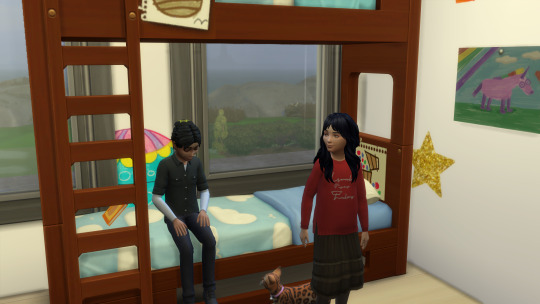
Here´s the twins Joseph and Zahavah, 11 years old. Zahavah is very excited as she´s preparing for her Bat Mitzvah. She´s very artistic and loves to draw and create things. Joseph loves playing outdoors and spends alot of time in their treehouse, he also has ADHD. Joseph and Zahavah always hang out together growing up, keeping up with them as toddler was a struggle for sure. Their favorite holiday is Purim!^^
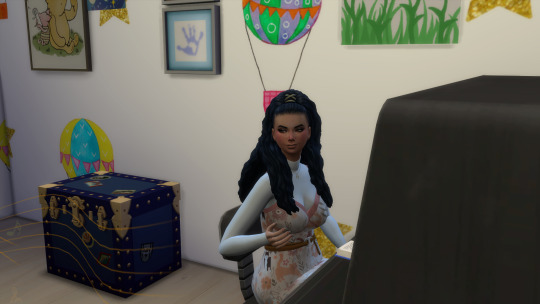
Naomi, 18 years old, is in her last year of High School. She wants to study to become a vet, animals and nature has always been a big passion for her. She´s helped taking care of the pets at the local shelter even since she was a kid, last year she found a homeless cat and adopted it. When she´s not helping pets or studying she will sit in her room reading a book or playing guitar. Not too long ago she was diagnosed with Bipolar Disorder, and her parents and family have been a great support system for her during her ups and downs. Her favorite holiday is Rosh Hashanah and Purim.
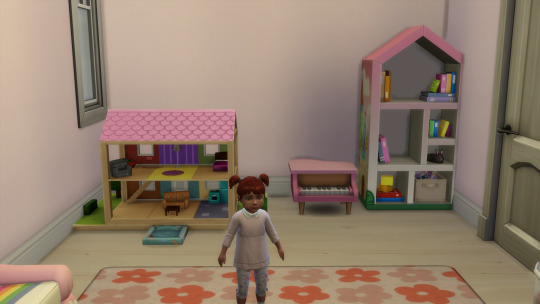
The youngest member of the family, Taliah. This little bundle of joy is 3 years old. She loves playing with the family pets and hanging out with her siblings, amd dancing to music. She loves trying to help in the kitchen even if it often ends up in a mess everyone is still having fun. Miranda has teached all their children from a early age to help cook and clean, it´s a important skill after all. Right now Taliah really loves Purim and Hanukkah.
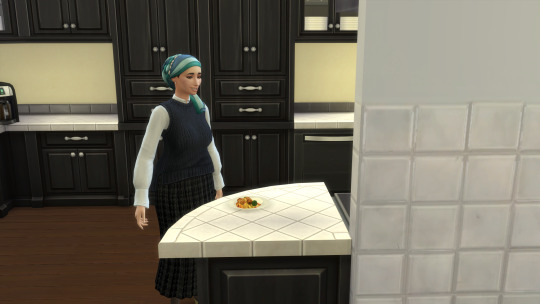
Miranda, 38, the mother of all the children. She´s a stay at home mom, she´s been a stay at home mom since their first child. When she isn´t cooking, cleaning or taking care of Taliah she loves to sit down with a good book or to work in her garden. She met Miriam during high school and fell in love with her right away. She was scared Miriam didn´t feel for her the same way, nor did she know how to tell her orthodox parents about being lesbian. But to her surprise, her parents took it very well. They had known it for a long time and had waited for Miranda to tell them herself when she was ready, and Miriam? She had a crush on Miriam as well but were too nervous to tell her too. Their wedding was lovely even though it took some time to find a rabbi for the wedding. She also has autism and her special interests are books and flowers and whenever she needs a break or feel overstimulated, Miriam is there to help her.
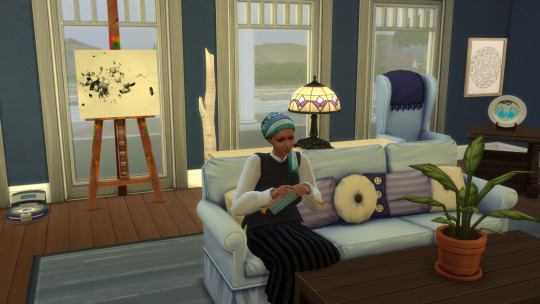
Miriam, 39. She works as a chef at one of the kosher restaurants in town, she´s mostly the one who cooks at home but both her and Miranda ejoys cooking. She has Seasonal Affective Disorder and got a service dog to help her, named Dodi. Dodi has helped her alot during her periods, she´s her little shadow and is always by her side. Miranda has helped her alot as well, knowing what to do and how to help. Miriam loves knitting clothes, something she learned from her bubbe, she holds those memories very close to her heart.
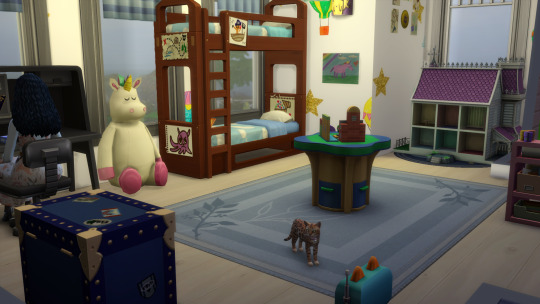

The family pets, the cat Zayit and Dodi.
#judaism#queer jews#jewish#sims 4 family#sims 4 story#jewish family#Sism 4 Jewish Family#jewish lesbian couple#Meet my Jewish Sims 4 family#I love them so much#their little cat and dog#Meet my Sims 4 family#Sims 4 family introduction
12 notes
·
View notes